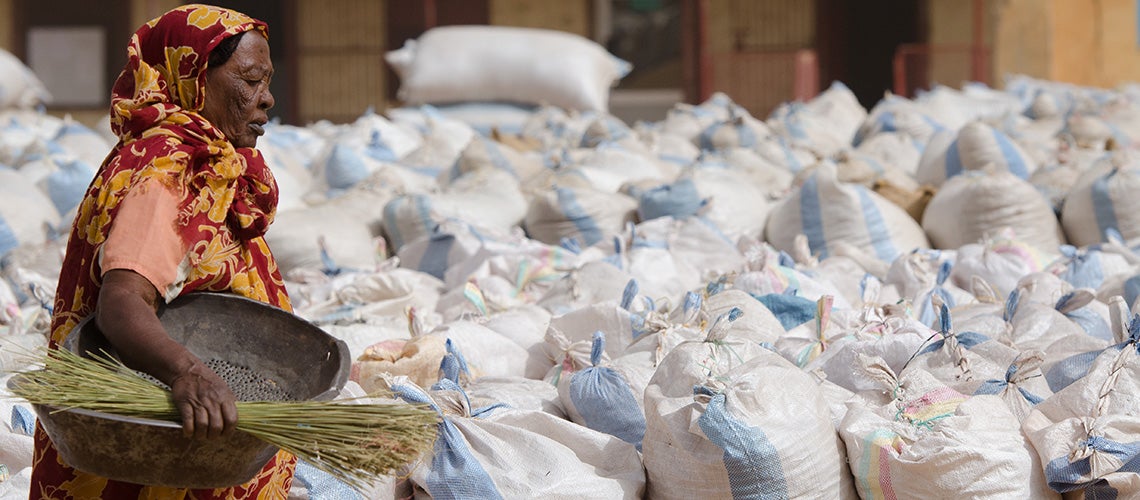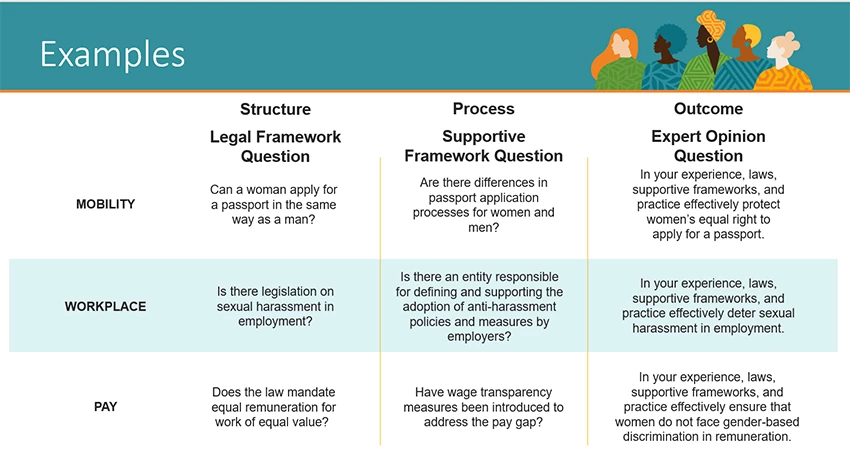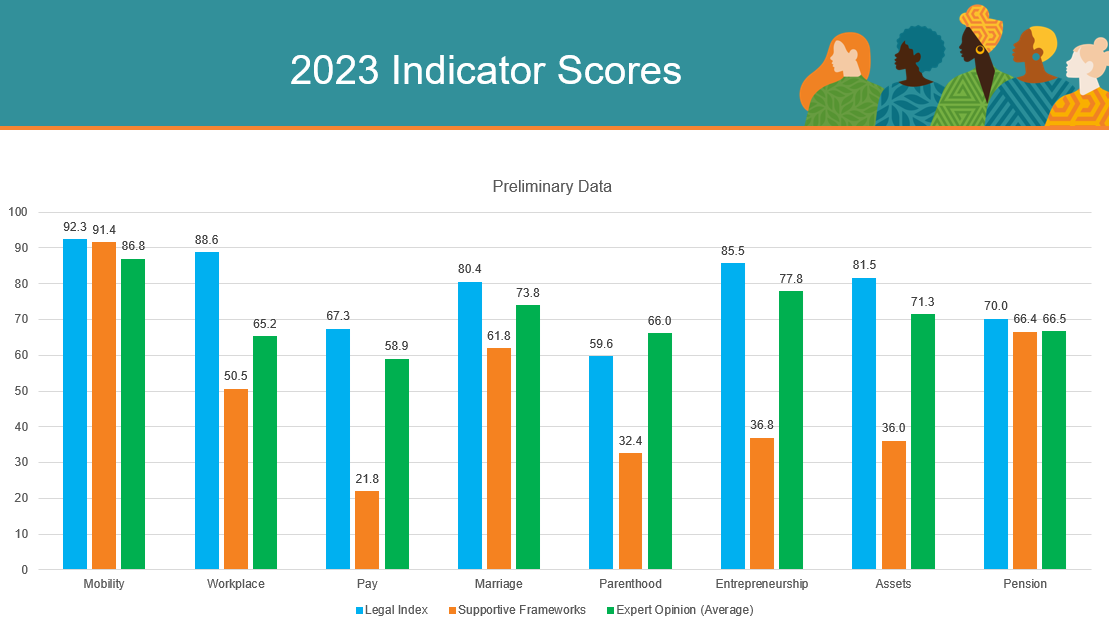 Scenes from Al Obaied Crop Market, North Kordofan Workers sort, repack and ship Gum Arabic lots. | © Salahaldeen Nadir / World Bank
Scenes from Al Obaied Crop Market, North Kordofan Workers sort, repack and ship Gum Arabic lots. | © Salahaldeen Nadir / World Bank
The data shared in this blog is part of the pilot “Measuring the law in practice” dataset, and was collected between October 2, 2021, and October 1, 2022. Based on the lessons learned from the pilot, the team refined its approach, including the methodology and questions. The new methodology and data will be presented in the 2024 edition of the Women, Business and the Law report, to be published in March 2024.
Fifty-one percent of countries around the world mandate equal remuneration between men and women, yet in all countries women are paid less than men, and at the global level the gender wage gap is on average about 20%. Similarly, while 85% of countries have laws on domestic violence, globally 1 in 3 women continue to experience domestic violence. Why is that? Weak enforcement of laws. One of the key factors that prevents women from fully enjoying their rights.
Reflections from legal experts who contribute to the Women, Business and the Law annual report, comments and inputs from World Bank and external colleagues, as well as a substantive body of evidence indicate that for women to actually thrive in the workforce countries must meaningfully enforce laws. Accordingly, since 2021, the Women, Business and the Law team has been going beyond its 10-year long approach which focused on measuring laws that affect women's economic opportunity without examining their implementation. To present a fuller picture of the real environment for women globally, Women, Business and the Law introduced a new conceptual framework to measure the implementation gap and undertake complementary analyses to the legal index. The “structure-process-outcome” method, was helpful in the development of this approach:
Examples of questions across the “structure-process-outcome” pillars:

Source: Women, Business and the Law data
Supportive frameworks data includes, but is not limited to national plans, policies, programs, services, incentives, as well as budgetary allocations, and expert opinion data is based on the collection of opinions of lawyers and legal experts through surveys. The new dataset aims at highlighting how many countries and in which areas there is a long way to go before women can realize their theoretical rights and opportunities under the law.
Starting with the collection of supportive frameworks and expert opinion data for 25 economies in 2021, the team gradually expanded its reach to 55 economies in 2022 and is currently collecting data for 190 economies. The new dataset, to be published next year, will capture the existence of key policy instruments and practices that support the implementation of laws in the eight areas WBL currently measures in its legal index, and in two new areas: violence against women (Safety) and childcare.
To calculate the supportive frameworks scores, Women, Business and the Law has maintained the same approach over time: indicator-level scores are obtained by calculating the simple average of the four or five binary questions within that indicator and scaling the result to 100 — with 0 representing the lowest score, and 100 the highest possible score and indicating equal rights and opportunities for men and women in all 35 areas of measurement. To calculate expert opinion scores, Women, Business and the Law has assigned a value to each expert opinion question response from 0 to 4 based on a 5-point scale from strongly disagree to strongly agree (strongly disagree = 0, strongly agree = 4). The median of response values received for each country is then scaled to 100. Data is only reported where at least two responses were received. Indicator level scores are then obtained by calculating the simple average of the four or five expert opinion questions within that indicator. An overall expert opinion score is then calculated as the simple average of eight indicator level scores.
The pilot data reveal glaring gaps between economies’ legal and supportive frameworks and expert opinions both at the overall and indicator score level. For the 55 pilot economies, the global average legal frameworks score is 78.1, versus supportive frameworks score of 49.6 — showing an almost 30-point gap between the two indices — and an expert opinion score of 71.5.
When comparing legal and supportive frameworks results, the indicator displaying the smallest gap — 0.9 points — is Mobility, where economies in the pilot dataset score on average 92.3 in their legal frameworks and 91.4 in their supportive frameworks. The largest gaps are observed in the Pay, Entrepreneurship and Assets indicators — respectively with 45.5, 48.6 and 45.5 points. Finally, supportive frameworks average scores are the highest in Mobility (91.4) and Pension (66.4), and the lowest in the Pay and Parenthood indicators, with an average score of 21.8 and 32.4 respectively. (More about these last two indicators is discussed in an upcoming blog)
Interesting findings emerge when looking at specific data points. For instance, while most economies in the pilot have legislation on sexual harassment in employment, about less than half have anti-harassment policies and measures to be adopted by employers in the workplace. The gap between legal and supportive frameworks is even wider when looking at the area of domestic violence, where about 80% of the economies in the pilot do not mandate nor fund or provide support services for women survivors of violence. Similarly, when it comes to the principle of equal pay for work of equal value, almost 90% of the economies analyzed do not have any wage transparency measure in place to address the pay gap. In the area of Parenthood, 93% of the economies lack incentives to promote fathers’ uptake of leave; and in the area of Assets, 85% of economies do not have incentives or programs (such as joint titling) to encourage women’s land tenure security, and 71% of economies do not have any procedure or guidelines in place to calculate non-monetary contributions equitably.
Legal and Supportive Frameworks and Expert Opinion Scores Using WBL 2023 Pilot Dataset

Source: Women, Business and the Law data
At the indicator level, expert opinion average scores are lower than the legal index score in all areas, and higher than supportive frameworks score across all indicators, except for Mobility and Parenthood. Given the small sample of legal experts surveyed during the development of the pilot dataset, and to provide a fuller picture of the “outcome” findings, the Women, Business and the Law team is currently significantly expanding its contributors’ database in all 190 economies. Further, in addition to lawyers and legal experts, the team is also surveying experts and organizations working on the ground to advance women’s rights.
Given the magnitude of the implementation gap arising from a glance at the 55-economies pilot dataset, the team is expanding its reach and collecting data for 190 economies, to be published in 2024. Women, Business and the Law remains committed to presenting a wider picture of the legal environment for women around the world to inform policy discussions and fill current gaps to advance women's opportunities.
Note: More data and information on this 55-economies pilot dataset covering the implementation of laws impacting women’s economic opportunities are available on the WBL website. As the team is continually refining its scope and approach, we would welcome your input and feedback. Support for the work was provided by the Knowledge for Change Program (KCP), State and Peacebuilding Fund (SPF) and United States Agency for International Development (USAID).


Join the Conversation